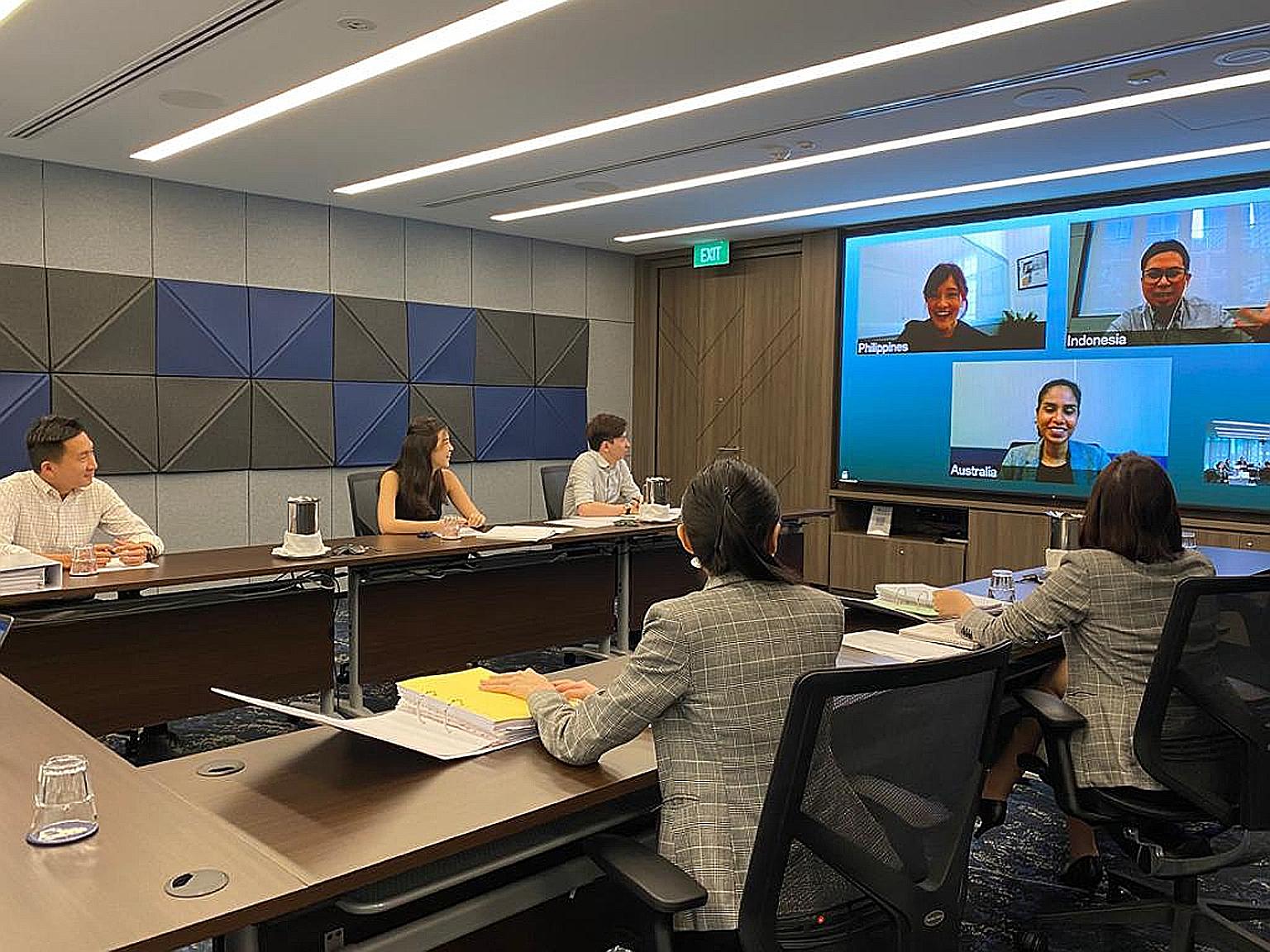Arbitration cases continue to grow amid pandemic
This is the ninth in the ST Legal Series that highlights legal topics of interest. The aim of the articles by Senior Law Correspondent K.C. Vijayan is to inform and enhance awareness. Today's subject dwells on international arbitration and Singapore's leading role as a hub to settle disputes.
Sign up now: Get ST's newsletters delivered to your inbox

A mock hybrid arbitration hearing at Maxwell Chambers for demonstration purposes. Arbitration hearings are closed-door and strictly confidential.
PHOTO: MAXWELL CHAMBERS
The Republic's arbitration activity has been upbeat, with the Singapore International Arbitration Centre (SIAC) and other industry players seeing continued growth.
The size of arbitration claims has expanded. An example is Amazon's claim, launched in the SIAC against India's Future Group to block a US$3.4 billion (S$4.6 billion) sale of its retail business to Reliance Industries, as reported in Global Arbitration Review earlier this month.
The SIAC, an independent, not-for-profit entity, has a track record of serving the global business community. "Our caseload this year has continued to experience strong growth, notwithstanding the Covid-19 situation," its chief executive officer Lim Seok Hui said last week.
Second Minister for Law Edwin Tong noted in Parliament earlier this month that SIAC saw a new high of 479 case filings last year.
"This is the third consecutive year that SIAC's caseload has exceeded 400, and we will aim to do even better in the coming years," he said.
The Paris-headquartered International Court of Arbitration of the International Chamber of Commerce (ICC) has a case management office in Singapore. After a brief slowdown in the second quarter of this year, the ICC said it has seen increased arbitration activity in all regions, including Asia.
"For the last 10 years, Singapore continues to be the top place of ICC arbitration in Asia, and we continue to see this trend even in 2020."
Singapore-based ICC Court director Abhinav Bhushan said the role of ICC, operating from Maxwell Chambers Suites, is to administer arbitrations predominantly with a nexus to this region.
The ICC Court inaugurated the Secretariat of the ICC International Court of Arbitration Singapore (Sicas) in April 2018.
As at last Thursday, Sicas has managed 227 cases, out of which 48 are new ones received this year, Mr Bhushan added.
Industry players like WongPartnership's head of litigation and dispute resolution Chou Sean Yu said the firm continues to see cases coming in and "several are actually quite high-profile and big ticket".
"I don't think the pandemic has resulted in a slowdown - I can certainly say that we have not seen any decline in arbitration cases. It may be partly because many of these disputes may have been brewing, anyway, for some time.
"That said, there are disputes which have arisen because of a commercial fallout caused or created by the pandemic."
Oon & Bazul's managing partner Bazul Ashhab suggested that recent developments in Hong Kong - like the recent postponement by its Chief Executive of her annual policy address and the Greater Bay Area initiative - will challenge the city's position as an arbitration seat and "will increase international arbitration work to Singapore at the very least in the immediate term".
"We have invested substantially in technology and training to be in the forefront of international arbitration work," he added.
Law partner Syazana Yahya of law firm Eugene Thuraisingam LLP said: "We have seen a rise in the number of expedited arbitrations. These would typically involve claimants with smaller claims and, in the wake of Covid-19, the looming threat of insolvency has increased the impetus for claimants to seek an arbitration award quickly, where this is an option."
Lawyer Peter Ong Lip Cheng, who runs his own firm, Peter Ong Law, and is on the panel of the Law Society Arbitration Scheme, said efficiency concerns will drive more to seek arbitration, where suitable.
London-based barrister Simon Milnes, who used to commute regularly to Singapore before Covid-19, said: "So far, arbitral hearing activity in Singapore remains brisk, as it does in London. The experience of the 2008 crash and the 2014 oil price collapse suggests that such volatility does cause an overall surge in disputes, especially through market-driven defaults, even though some companies find they lack the resources to pursue defaulting counterparties."
He added that Singapore's success rests on four crucial pillars - its neutrality, anti-corruption culture, a diverse and dynamic legal profession, and a judiciary that understands and supports arbitration.
"This is why I believe Singapore will retain - and even grow - its edge over rival centres. It is hard to replicate even one of those four factors, let alone all four at once. Without them, an arbitration institution, however good in itself, cannot grow into a thriving hub," he said.


